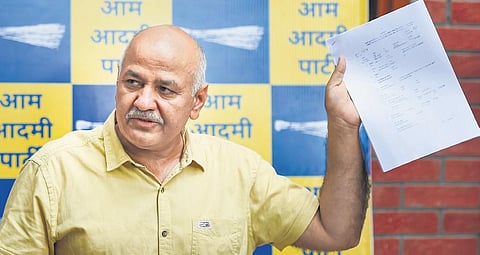

The Anatomy of a Scam
How AAP govt gave windfall profits to a few
Since The New Indian Express broke the story of the Kejriwal government drafting a liquor policy to favour a few, this columnist has been inundated with calls and messages asking what could be wrong with a policy that helped bring down booze prices and made tipplers happy. The fact that all was not well with the policy became evident when the government withdrew it citing a huge drop in the state’s revenue after its implementation. Here’s a brief lowdown on the wrongs committed by the Delhi government. The new policy allowed wholesalers to offer discounts and rebates to retailers of their choice. This tilted the playing field in favour of select retailers who reaped windfall profits with the help of wholesalers. The old policy mandated uniform discounts for all retailers.
As a result of huge discounts received from wholesalers, some retailers started offering a buy-one-get-one-free scheme. More than half of all retailers in Delhi could not survive this predatory pricing and surrendered their licenses. The Delhi government, instead of retendering the closed retail zones, allowed the existing ones to double their profits with buyers from the closed zones flocking to them. The increased sales of some retailers did not yield commensurate profits to the government. In the new policy, the state shifted from excise-based revenue to license fee regime. It reduced the nearly 200 percent excise duty on the wholesale price to one percent duty on sales.
In order to make up, it introduced a high license fee of Rs 300 crore per retailing zone per annum. But with half the zones shutting down, the government lost the license fees and earned almost nothing from the doubling of sales of the operating half. As a result, while some retailers made windfall gains, the state’s revenue dropped to Rs 3,700 crore from Rs 6,300 crore in the previous year. The government had announced that the new policy would raise its revenue earning to Rs 9,000 crore.
The state government also appears to have knowingly allowed violations of the provisions of the new policy. The policy mandates that manufacturers, wholesalers, and retailers will work in their respective silos. A manufacturer cannot be a wholesaler or a retailer, similarly, wholesalers and retailers cannot get into the other two businesses. But there are examples of the government turning a blind eye to many manufacturers getting into wholesaling and retailing, and wholesalers bagging retailing licenses.
Key Conspirators
Politicians, a media house, and friends of AAP
The Delhi government’s new excise policy is alleged to have been drafted and executed with the involvement of a set of people who were not part of the government. These people reportedly worked closely with deputy chief minister Manish Sisodia, who also holds charge of the excise department, and emerged as key beneficiaries of the policy. Among them are Vijay Nair, former CEO of M/s Only Much Louder, an entertainment and event management company, Manoj Rai, who has been till recently an employee of Pernod Ricard, Amandeep Dhal, owner of Brindco Spirits, Sameer Mahendru, owner of IndoSpirits, Amit Arora, Director of Buddy Retail Pvt Ltd, Dinesh Arora, a liquor trader, Sunny Marwah, a director in companies/firms being managed by the family of late Ponty Chadha, and Arjun Pandey, who has been associated with a media company headquartered in south India.
These people are considered close to Sisodia and their role in customising the new liquor policy to extend wrongful favours to select wholesalers, and managing the alleged kickbacks from liquor licensees is now being probed by the CBI. The role of two large liquor manufacturers is also reportedly being looked into. Sameer Mahendru and Amandeep Dhal are associated with these two manufacturers. Sources said Vijay Nair’s company has reportedly been involved with the Aam Aadmi Party. Though a private person, Nair is said to have attended meetings that Sisodia held with top state government officials to finalise the new liquor policy.
There are reports that state government officials did not like Nair’s presence in the meetings as he tried to bulldoze them on Sisodia’s behalf. YSR Congress Party member of Parliament Magunta Sreenivasulu Reddy has also been a key beneficiary of Delhi’s new liquor policy. Reddy and Hyderabad-based company Sri Avantika Contractors (I) Pvt Ltd controlled almost one-third of Delhi’s liquor vends through investments. The CBI is likely to look into the books of these two entities. The investigative agency has cast its net wide, but Manish Sisodia will remain at the centre of its investigations.